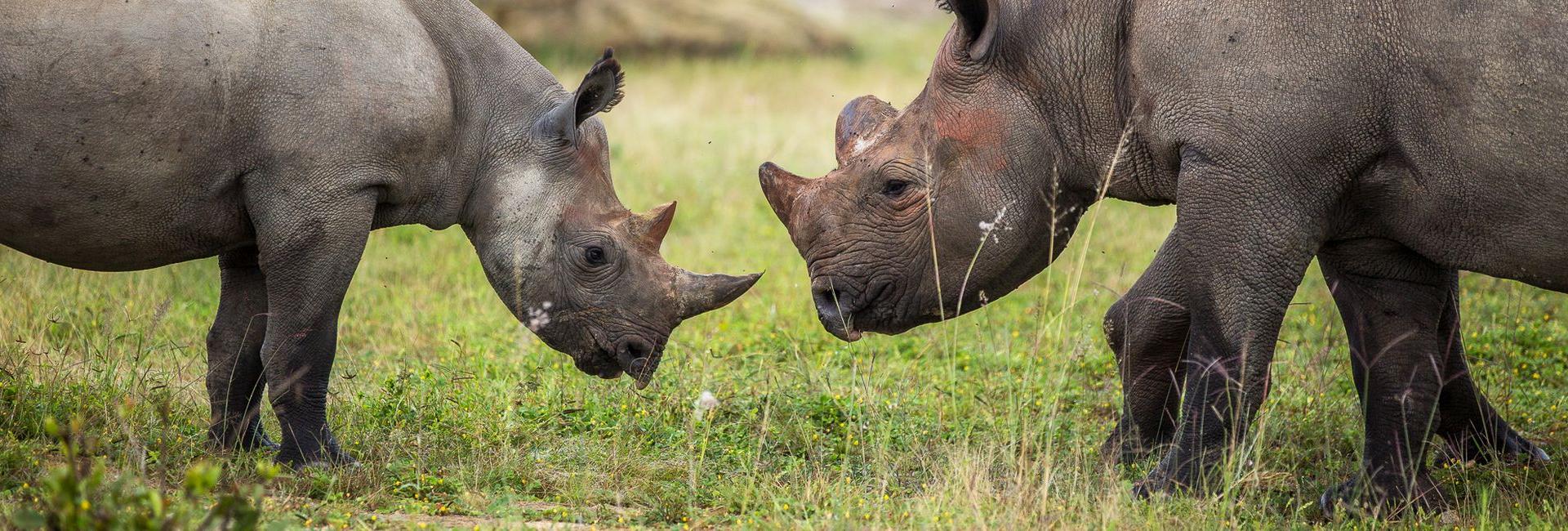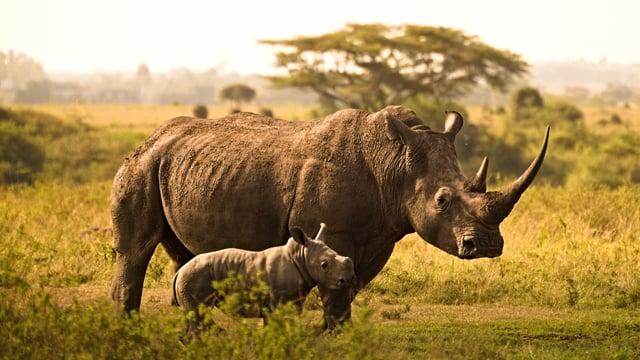
Rhinos
Volunteer With Rhinos
Have you ever wanted to volunteer with rhinos? By doing so you can play an active role in the conservation of one of Africa’s most iconic species.
With their armour like skin, barrel-shaped bodies and the impressive horn which protrudes from their face, the rhino is surely a must-see on any wildlife enthusiast’s checklist. Here at The Great Projects, we provide you with the chance to see these creatures in the flesh on our many rhino volunteer projects.
Rhinos are relentlessly hunted for their horns, which value roughly at $100,000 per kilogram on the black market. This astronomical price rivals, and even overtakes the value of many other lucrative substances such as gold which can be traded on the black market. The horns are used as ingredients for Asian medicine despite evidence that there is no medicinal value in them, or they are used by humans as status symbols of wealth and success. Seemingly, this is an unnecessary trade that comes at the cost of the life of a rhino, and humans have placed this price on their heads. In 2017, there were more than 1000 rhinos slaughtered in South Africa alone.
It is clear that something must be done to try and preserve the rhino, who, like every other species in the animal kingdom play a vital role in the ecosystem. They are an umbrella species, which means their survival or demise impacts the survival of other species from birds to various types of mammals. By volunteering with rhinos, you can help to provide them with a sustainable future for generations to come, whether it be by helping to feed the animals, caring for them out on vast African reserves, or taking part in security patrols.
What are you waiting for? Secure your place to volunteer with rhinos today!

Projects Do More
13 - 27 Nights from $1,619.00
Help make a difference to Zimbabwe's incredible wildlife and visit the breath-taking Victoria Falls.
View project14 - 84 Nights from $1,619.00
Assist in vital conservation efforts in South Africa, working to protect the iconic ‘Big 5’ and other priority endangered species.
View project7 - 84 Nights from $744.00
Join this 'Big 5' conservation project and help make a difference to the lives of the amazing animals that live here!
View project7 - 84 Nights from $994.00
Volunteer with the 'Big 5' on one of the country’s most diverse wildlife reserves.
View project7 - 84 Nights from $1,119.00
Volunteer with rhinos and elephants in Zimbabwe on this amazing conservation project!
View project7 - 14 Nights from $1,494.00
Conserve rhinos and elephants on horseback at a unique game reserve in Zimbabwe.
View project7 - 56 Nights from $1,994.00
Luxury meets conservation at our brand-new 'Big 5' project! Experience wildlife rescue and rehabilitation missions in the home of Safari, South Africa.
View project14 Nights from $3,369.00
Help rescue a rhino from a high-risk poaching area and relocate the animal to the safety of the SanWild Sanctuary & Reserve!
View projectOn the Blog
Rhino Information
Rhinos At A Glance
Endangered Status
Endangered/ Critically Endangered
Number remaining in the wild
Around 29,000
Endemic Region
Africa and Asia
There are five different species of rhino, and all five are classified as endangered.
The tiny population of just 58-61 Javan Rhinos makes it the rarest large land animal on Earth. There are marginally more Sumatran rhinos with approximately 100 individuals remaining, and the Greater One-Horned Rhino has a population of roughly 3,300. The more commonly known Black Rhino is estimated to have around 5,455 individuals remaining, with the White Rhino population standing at around 21,077.
Two rhino subspecies have become extinct in recent years: the Northern White Rhino in 2018 and the Western Black Rhino in 2011.
Conservation efforts are ongoing to protect rhinos and their habitats, but urgent action is needed to prevent further decline and ensure the survival of these magnificent creatures.
Rhinos may look strong and almost invincible, but they are becoming more and more vulnerable and face considerable threats, including:
- Poaching: The most immediate threat to rhinos is poaching for their horns. Rhino horns are highly valued in some cultures, particularly in traditional Asian medicine markets, where it is falsely believed to have medicinal properties. This demand drives illegal poaching, which has decimated rhino populations worldwide.
- Habitat Loss: Human activities such as agriculture, urbanisation, and infrastructure development lead to habitat loss and fragmentation, which reduces the available space for rhinos to roam and find food, water, and mates. Fragmented habitats also increase the risk of human-wildlife conflict.
- Human-Wildlife Conflict: As human populations expand into rhino habitats, conflicts between rhinos and humans can arise. Rhinos may damage crops, and in some cases, they can pose a threat to human safety, leading to retaliatory killings or efforts to relocate or remove rhinos from certain areas.
- Climate Change: Climate change can impact rhino habitats by altering temperature and precipitation patterns, affecting the availability of food and water. Changes in habitat conditions can also increase the risk of disease transmission and exacerbate existing threats such as habitat loss and fragmentation.
- Illegal Wildlife Trade: In addition to poaching for their horns, rhinos may also be targeted for other body parts, such as their skin or bones, which are used in traditional medicine or as status symbols. The illegal wildlife trade further threatens rhino populations by creating additional pressures on already vulnerable populations.
- Disease: Rhinos are susceptible to various diseases, some of which can be transmitted by domestic livestock or other wildlife species. Outbreaks of diseases such as anthrax or foot-and-mouth disease can have devastating effects on rhino populations, especially in areas where they come into contact with livestock.
Addressing these threats requires coordinated efforts from governments, conservation organizations, local communities, and the international community. By joining a rhino conservation project, you can play a crucial role in protecting rhinos through activities such as anti-poaching patrols, habitat restoration, community engagement and education, and translocation programs.
Volunteering with rhinos is a meaningful way to contribute to their conservation while also experiencing these majestic creatures up close. Some popular destinations where you can volunteer with rhinos are South Africa, Kenya, Zimbabwe, and Namibia.












